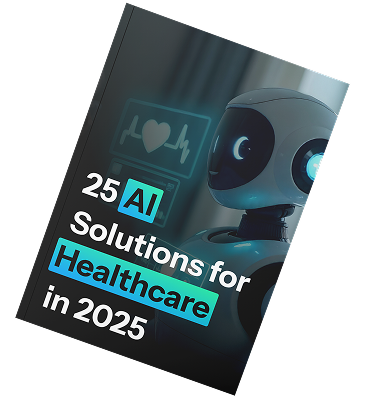AI Patient Engagement: Use Cases, Tools, and Challenges in 2025

Healthcare is moving away from the traditional fee-for-service model – to value-based care and is becoming more patient-centric.
That means patients are getting more personalized care experiences, greater convenience-and more control over their healthcare through digital tools. AI is driving these changes by increasing patient engagement, automating the workflow for providers and making individualised care a reality.
As these AI innovations prove themselves, adoption across the industry is happening fast. In fact the global AI in healthcare market is projected to be USD 95.65 billion by 2028 so we are in the midst of a big change in how providers interact with patients.
This detailed guide examines:
- Why invest in AI patient engagement
- How solutions like Black Doctor, PareIT, Hyro AI Assistants, Mytonomy, and Abridge can enhance patient engagement
- Common challenges in AI implementation for patient engagement
- Comparison of ready-made vs custom AI solutions pros and cons
- How Riseapps can help with the development of custom AI solutions for healthcare
What is AI Patient Engagement?
Patient engagement is defined as an individual’s active involvement in the care decision-making process and collaboration with key stakeholders to build an equitable and sustainable health system.
AI patient engagement combines artificial intelligence technologies with healthcare systems to involve patients in their care and transform patient interactions with information access and treatment participation.
What Are Core AI Patient Engagement Technologies?
There are several interconnected technologies that form the foundation of effective artificial intelligence patient engagement. Among them are:
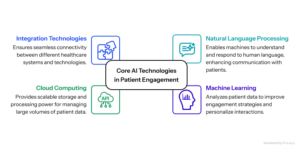
- Natural Language Processing (NLP) helps systems understand and generate human language, which enables natural conversations between patients and AI systems. NLP interprets user intent, understands context, and responds to patient queries accurately.
- Machine Learning (ML) enhances artificial engagement engagement tools’ adaptive capabilities. These tools learn from each interaction and improve their responses based on patient data. This technology customizes health recommendations and educational content.
- Cloud Computing processes huge amounts of patient data and delivers real-time insights and support. The ability to process large data volumes through cloud computing creates a turning point where AI applications can fill gaps in patient monitoring.
- Integration Technologies link artificial intelligence systems with electronic health records (EHRs), customer relationship management (CRM) systems, and practice management platforms. This connection ensures accurate, context-specific responses.
Deloitte research shows approximately 70% of surveyed health system executives think investing in AI patient engagement technology matters to their organizations.
How Conversational AI Transforms Patient Engagement?
Conversational AI changes patient-provider communication through sophisticated tools that enable natural, human-like interactions via speech, text, or voice interfaces.

Unlike traditional rule-based chatbots that follow rigid scripts, these artificial intelligence solutions adapt their responses based on user inputs and prior interactions.
Conversational AI in patient engagement bring many benefits:
- 24/7 Availability: Patients can access information whenever needed through conversational AI support that extends beyond office hours.
- Personalized Communication: Conversational AI analyzes patient data to customize interactions based on health literacy levels, language preferences, and effective delivery formats.
- Intelligent Triage: Patient query urgency assessment and appropriate care level direction ensure timely intervention, reducing healthcare system burden while adequately addressing patients concerns.
- Enhanced Efficiency: Healthcare providers can focus on complex, high-priority cases while conversational AI handles routine tasks like FAQ answers, appointment booking, and insurance eligibility verification.
How Generative AI Helps Patient Engagement?
Generative AI engages patients by creating personalized and interactive health messages for each patient. It helps summarise doctor patient conversations, simplify medical information and deliver proactive guidance through chatbots and virtual assistants.
Generative artificial intelligence enables meaningful patient engagement as well as adaptive, accurate and timely support.
This helps patients understand their condition, follow treatment plans more closely and stay connected to their care team, resulting in better health outcomes and patient satisfaction.
Why Invest in AI Patient Engagement in 2025?
With cost-effectiveness and patient satisfaction on the rise, AI in patient engagement goes from nice to needed. This investment delivers tangible, measurable benefits across financial growth and better health outcomes.
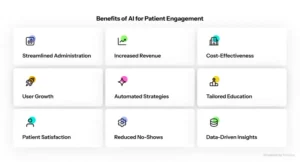
Below are the top nine reasons to put artificial intelligence patient engagement in your 2025 plan:
1. Increased Annual Revenue
AI-driven patient engagement solutions directly drive healthcare revenue. Through automated and proactive patient outreach, organizations can reduce service cancellations, lower costs and grow their patient base.
For example, after the launch of an AI-powered telemedicine mobile app and platform, Black Doctor, reached a $100M revenue goal.
2. Cost-effectiveness and Optimized Resource Allocation
AI-powered patient engagement solutions can reduce operational costs, streamline resource allocation and optimise revenue cycle management across healthcare organisations.
For example pareIT, an artificial intelligence medical summarisation software provider, has achieved cost savings of $10,000 per year per medicolegal professional.
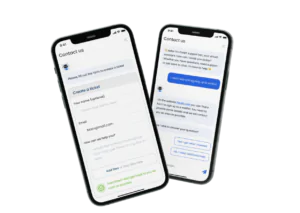
Compared to traditional clinical and legal documentation PareIT’s AI solution summarises up to 3 times more cost effectively, so more admin time can be spent on patient care.
Artificial intelligence in dementia care platforms can increase caregiver productivity and health outcomes. A recent Riseapps’ case study showed how dementia management software powered by AI can increase caregiver efficiency by 65%.
That’s a big boost to get tasks done, support patients and have personal interactions, to overall improve dementia care and reduce caregiver burden.
➡️ Learn more about this case study.
3. Growth in Active Monthly Users
AI solutions create far-reaching patient connections, resulting in double-digit growth in active user engagement.
Institutions using conversational AI and virtual health platforms can see up to 200% increase in monthly users, increasing their market share and visibility in a competitive healthcare landscape.
4. Reduced No-Shows
Missed appointments cost the US healthcare system $150 billion annually. AI-driven appointment reminders, automated follow-ups, and artificial intelligence voice outreach can reduce no-shows by up to 30%.
5. Improved Patient Satisfaction and Lifetime Loyalty
Patients expect consumer-like care experiences from healthcare. AI engagement platforms personalize patient experiences, resulting in higher satisfaction scores and deeper lifetime loyalty.
A Deloitte study found personalized patient interaction increased patient satisfaction scores by over 30% in one year.
6. Tailored Education and Treatment Adherence Interventions
Generative AI creates personalized educational content and treatment adherence interventions, helping patients understand and participate in their own care.
Personalized interventions increase medication adherence by up to 30%.
7. Automated Patient Engagement Strategies
Automated and proactive patient engagement workflows, including appointment reminders, screenings and medication reminders, improve preventive care measures and screening compliance rates.
8. Streamlined Administrative Tasks
Administrative tasks take up to 28hr per week of clinical professionals’ time. AI in administrative automation frees up staff time so clinicians and providers can focus more on patient care and clinical decision making.
9. Data-driven Insights for Reduced Hospital Readmissions
Artificial intelligence solutions provide rich data analytics to predict health risks and shape proactive interventions. Data-driven patient outreach and preventative health measures powered by AI predictive analytics lead to better clinical outcomes, improved patient health and reduced hospital readmissions.
How AI Is Used in Patient Engagement? Use Cases & Examples
AI-powered Support and Communication
Examples: Amina for Black Doctor 24/7 app, Woebot, Sensely’s Molly, Microsoft Dragon Copilot, Hyro AI
AI-powered virtual assistants and chatbots are changing the way healthcare organizations connect with patients. They work as digital companions throughout a patient’s healthcare experience and make healthcare more available while reducing the workload of clinical staff.
24/7 Patient Support with AI-Powered Assistants
Traditional healthcare channels only allow patient interaction during business hours, leaving critical needs unmet overnight or on weekends. AI powered virtual assistants break through this barrier, providing immediate 24/7 support – a huge advantage for urgent patient needs.
This is not just convenient, it’s also better for patient experience and care. Research shows that AI chatbots create judgment free environments where patients feel safe to talk about sensitive or personal issues.
In fact 20% of studies reported users would share detailed personal information with chatbots – information they would often hesitate to share with healthcare providers.

Riseapps partnered with Black Doctor to build “Amina” – an AI powered health assistant to improve patient engagement process.
Amina automated routine patient queries and accelerated the diagnosis process by 65%. The assistant did symptom triage and guided users through simple self-assessment protocols, providing fast and personalized patient engagement at any time of day.
➡️ See BlackDoctor 24/7 app in action in the video demo.
In addition to proactive patient care, AI assistants are great at managing administrative workflows including:
- Appointment scheduling
- Prescription refill requests
- Medical records updates and management
Real life examples prove this. For instance implementing Sensely’s virtual AI assistant has reduced clinics 30 day readmission rate by as much as 75%.
Moreover, using AI driven smart call routing technology – like Sensely AI Assistant– has improved patient support services dramatically.
Organizations using Hyro’s intelligent routing have seen a 85% reduction in call abandonment rates and 79% improvement in response time, resulting in higher patient satisfaction and trust in healthcare systems.
Personalised Communication with Healthcare AI Chatbots
Healthcare AI chatbots have come a long way in personalising patient interactions by intelligently using multiple data sources. These include:
- Electronic health records (EHR) stored in CRM and patient engagement platforms,
- Clinical notes accessed through patient portal apps,
- Real-time physiological data points from connected sensors and wearable devices,
- Historical patient conversations via SMS, email and voice calls,
- User interaction patterns from messaging platforms like WhatsApp, WeChat and Telegram.
Using advanced machine learning (ML) and natural language processing (NLP) algorithms, healthcare chatbots analyse this treasure trove of patient information to identify meaningful patterns and insights.
These AI powered patient engagement evaluations enable chatbots to adjust their communication style in real-time, taking into account each patient’s literacy levels, cultural background, individual preferences and unique health needs.
This personalisation leads to stronger, more trusting relationships between healthcare providers and patients. Patients experience higher satisfaction, better adherence to care plans and overall better health outcomes.
A great example of this is Microsoft Dragon Copilot captures. This advanced conversational AI solution captures multi-party, multi-lingual patient-provider conversations in real-time and turns them into comprehensive, specialty specific clinical documentation.
Beyond capturing conversations, Dragon Copilot gives healthcare teams customised documentation templates, seamless referral letter generation and user friendly, easy to understand after visit summaries, increasing productivity and clarity throughout patient journeys.
Customized health education
Well-designed virtual assistants make a real difference in patient education. These tools excel at providing custom health education about:
- conditions,
- medications,
- lifestyle changes,
- preventive measures.
They can adjust how they communicate based on how well patients understand the information, making health guidance available to everyone.
Virtual AI assistants, as seen in the Hyro AI case study with Weill Cornell Medicine (WCM), increased user engagement on healthcare websites.
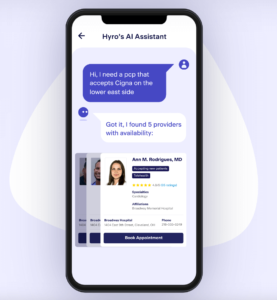
After adding AI powered virtual assistants WCM saw: 30% reduction in bounce rate, 350% increase in pages per session and 600% increase in session duration.
This patient outcomes research shows how well virtual assistants can grab attention, guide users through content and overall digital patient engagement.
AI-driven Learning Automation for Patient Engagement
Examples: Ada Health, Docus Symptom Checker, Mytonomy, Meducation
The U.S. Department of Education reports that 54% of Americans between ages 16 and 74 read below the equivalent of a sixth-grade level. This gap creates barriers to care that AI technology can uniquely address.
Adapting to patient literacy levels
AI algorithms provide a solution to literacy gaps by analyzing data that covers demographics, medical histories, socioeconomic factors, and behavioral patterns to create complete profiles for personalized treatment plans.
AI-driven patient engagement systems use natural language processing to:
- Automatically rewrite educational materials to match specific reading levels
- Present complex medical concepts using simpler vocabulary
- Adjust sentence length and structure for improved readability
- Format content with ample white space and clear organization
Moreover, artificial intelligence tools powered by ChatGPT and Google Bard show promising results in simplifying written patient information to meet these guidelines. The technology needs more work, but it helps bridge the gap between provider expertise and patient understanding.
Multilingual and culturally tailored materials
AI-powered translation capabilities have altered the map of healthcare communication. Meducation serves as a great example – this cloud-based solution fits right into electronic health record workflows and creates medication labels and instructions in more than 30 languages.
Cultural adaptation goes beyond simple translation. AI systems analyze cultural contexts to arrange educational materials with patients’ values, beliefs, and customs. This cultural awareness prevents misunderstandings that often happen when translations miss the nuances of a patient’s beliefs or customs.
Interactive educational modules for treatment adherence
AI-driven interactive education makes a big difference in medication adherence. Imagine an AI smartphone application with a chatbot like “Vik” that gives medication reminders and dosing instructions.
The system sends personalized text messages with relevant, quality-checked medical information about treatments, side effects, and lifestyle considerations. Users who used its reminder feature can improve their medication compliance by more than 20%.
AI adds engaging elements to patient education through:
- Chatbots enable real-time questions and clarifications.
- Gamification techniques including rewards for completing educational modules.
- Visual aids including diagrams and infographics explaining complex concepts.
- Adaptive content that responds to demonstrated comprehension levels.
Mytonomy has a great patient engagement research that shows how interactive AI-driven patient education can make a big difference.
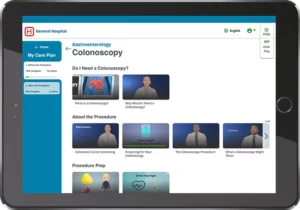
They used visuals and video to give patients accessible and personalized health info. 57% of patients who watched the interactive videos took action and got a colorectal cancer screening – clearly showing the link between patient education and preventive care adherence.
Personalized Patient Care Plans
Traditional care management solutions offer generic and static recommendations, ignoring a patient’s individual circumstances, real-time health changes, or caregiver input. One-size-fits-all approaches reduce care effectiveness and patient satisfaction.
For one of the clients, Riseapps used advanced AI algorithms built around Large Language Models (LLMs) with Retrieval-Augmented Generation (RAG) to create highly adaptive, personalized care plans.
These AI-powered recommendations combine a patient’s full medical history, real-time symptoms and caregiver feedback to ensure plans are precise, relevant and adaptable to each patient’s changing condition.
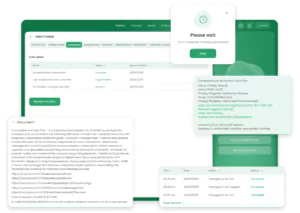
The benefits of AI-driven care plans include:
- 20-30% improvement in care plan accuracy and relevance so interventions match patient needs.
- Interventions tailored to individual conditions and preferences for improved health outcomes.
- Adaptive care for more accurate symptom management, disease course management and overall better health outcomes.
Administrative Workflow Optimization
Examples: pareIT, Olive AI, Nym Health, Augmendix, Abridge
Healthcare providers in the United States waste about 30% of its spending on administrative tasks. AI tools for patient engagement provide powerful ways to make these processes more efficient.
This lets clinical staff spend more time with patients while cutting costs.
AI-Powered Patient Documentation and Note Summarization
Artificial intelligence solutions like AWS HealthScribe automate patient documentation by converting doctor-patient conversations into structured clinical notes. By listening in on patient visits, these AI tools create notes on key points like patient complaints, medical history, assessments and treatment plans.
To ensure accuracy, each section of the AI-generated notes links back to the original recorded conversation so you can verify with ease.
➡️ See how PareIT medicolegal software helps personal injury attorneys in the video.
After deploying the Abridge AI note summarization platform, clinicians at Sutter Health saw amazing results – 59% better notes and 78% higher job satisfaction. These case studies show just how powerful AI-driven documentation can be so you can spend less time on paperwork and more time on patient care.
Advanced patient record search
AI powered tools make search multi-class and multi-component search with AI generated context. Healthcare providers and administrators can quickly navigate and process large volumes of medical histories, diagnoses and related legal cases.
By using these powerful AI search tools you can get to critical patient information – fast, accurate and better patient care.
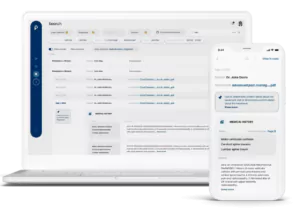
Sophisticated reporting and data analysis
AI driven reporting tools automatically find and highlight specific cases that need attention and give a breakdown of each individual patient case. Interactive dashboards powered by AI allow you to see the whole workflow, sort cases by status and do bulk editing and management tasks with ease.
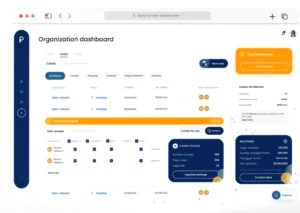
With real time insights and instant support, you can manage your resources, proactively address patient needs and increase user productivity.
Plus, AI powered patient engagement analytics is a control center that can process and organize thousands of patient records. This makes activities like tracking patient cases, managing billing and subscription status, reviewing purchase requests and handling information at scale easy.
Get in touch with Riseapps today, and let’s explore how our experts can deliver custom AI reporting and search solutions tailored specifically for your healthcare organization.
Medical coding and billing automation
Smart machine learning looks at clinical documents and assigns billing codes itself which results in less manual work and less mistakes.
Artificial intelligence helps medical coding in several ways:
- Claim scrubbing – Artificial intelligence spots and fixes claim errors before sending them, which means fewer rejections.
- Denial prediction – Machine learning spots likely denials early and fixes issues proactively.
- Pattern analysis – AI looks at denial patterns to fix systematic problems.
- Revenue forecasting – AI analytics give accurate financial predictions to plan resources better.
Besides this, AI can automate billing, payments, subscriptions and account management. With this in place users can faster:
- manage multiple payment gateways,
- see active subscriptions,
- view billing history,
- generate and scan invoices and billing documents.
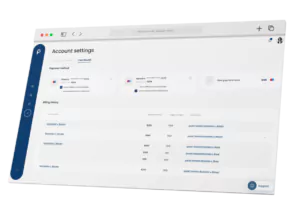
This means healthcare organizations get paid faster and have better cash flow.
Automated reminders, scheduling, and alerts
AI appointment systems are changing how patient scheduling works by spotting patterns and making the best use of resources.
Smart algorithms look at scheduling patterns and patient histories to schedule appointments better. The staff’s workload drops by about 50%, giving them more time to help patients with complex needs.
AI-driven platforms can cut missed appointments by up to 30% through automatic reminders and confirmations. On top of this, the AI patient engagement systems adjust schedules right away when patients cancel, fill empty slots, and save precious clinical time.
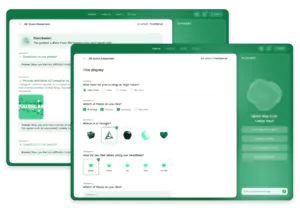
Implementing AI solutions like this delivered:
- 25% faster response to critical events,
- Reduced staff burnout and increased productivity,
- Proactive patient centric care management.
AI driven alerts and recommendations align with modern healthcare industry best practices, identify risks early and support timely interventions, resulting in better patient outcomes.
Common Challenges in AI Patient Engagement Implementation
AI shows great promise in healthcare, but putting these technologies into practice comes with major hurdles. Healthcare providers face unique challenges they need to solve before AI becomes part of their daily patient care.
Data Privacy and HIPAA Compliance Requirements
Healthcare AI must work within strict rules about patient data protection. AI needs huge amounts of data for training, which increases privacy risks for healthcare organizations.
Healthcare organizations need these safeguards to stay HIPAA compliant with :
- Reliable encryption for patient information storage and transfer.
- Strict access limits so only authorized staff can see PHI.
- Advanced data anonymization methods like differential privacy.
Notwithstanding that, standard data protection methods often fall short. Patients have been identified even in datasets that meet HIPAA rules. Better security practices must evolve to keep patient trust while making use of information AI provides.
Our team holds ISO 9001, ISO27001, SOC2 certifications that help us implement rigorous security measures to protect your patient data and maintain regulatory compliance.
➡️ See a HIPPA-compliant AI wound measurement platform, TheWoundPro, in action.
Integration with Existing Healthcare IT Systems
Introducing artificial intelligence into existing healthcare infrastructure can be both technical and operational challenges. Many current patient engagement software just isn’t designed to handle the data requirements and processing power that AI solutions need, so you’ll need to upgrade and adapt.
This integration process requires significant financial resources, technical expertise and cross-functional teams. After initial deployment, ongoing maintenance, monitoring and adjustments are critical to performance.
And it’s not just technical hurdles. Poorly planned or executed implementation can have serious consequences – subpar results, operational bottlenecks, patient dissatisfaction or in worst case scenarios, adverse patient outcomes. And high costs of third-party providers for telemedicine solutions and eSignatures can hinder you from scaling affordably.
This led to 40-60% cost savings compared to traditional subscription-based services.
Addressing Algorithm Bias and Data Accuracy
Algorithm bias might be the biggest problem in healthcare AI adoption. Most medical datasets leave out many population groups, which creates big gaps in accuracy.
AI systems trained on these uneven datasets risk making healthcare inequality worse. Research shows many algorithms make ethnic minorities much sicker than white patients before they get the same diagnoses, treatments, or resources.
Risapps team will help you reduce bias at every step with:
- Detailed data collection from people of all backgrounds
- Regular checks for algorithm fairness
- Ongoing testing across different demographic group
These core issues need solutions. Without them, artificial intelligence systems might make health gaps bigger instead of smaller.
How to Choose AI in Patient Engagement: Custom VS Ready-Made Solutions
When considering patient engagement software, healthcare providers face a fundamental choice: buy or build.
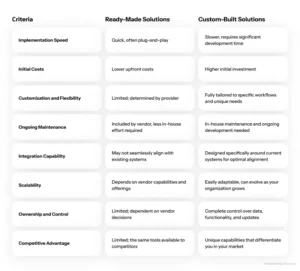
Both have pros and cons. Buying ready-made tools can mean speed and convenience, while building custom patient engagement software means flexibility and control.
Let’s take a closer look at each to help you decide which is right for you.
Ready-Made Solutions Pros & Cons:
Pros: Buying off the shelf software means quicker launch and lower upfront costs. Plus, less strain on internal IT teams since the vendor manages the platform.
Cons: These products have limitations in flexibility—you’ll have fewer customizations and less control.
Vendor lock-in is another challenge—your provider decides future upgrades and it’s hard to adapt as needs change.
Custom AI Tools for Patient Engagement
Pros:
- Building a custom AI patient engagement solution gives you powerful competitive advantages tailored to your workflow.
- This level of customization gives your healthcare team and patients exactly what they need—no extras or compromises.
- Custom solutions are scalable, you have complete control and ownership
- Custom built software integrates organically into your ecosystem, so seamless interoperability with existing systems, workflow efficiencies and minimal disruption to clinical operations.
Cons:
While custom AI solutions require high upfront investment and ongoing solution maintenance, long term returns like patient satisfaction and lifetime loyalty often outweigh the cost.
When to Build a Custom Patient Engagement Software?
A custom built AI patient engagement tool might be right for you if:
- You have unique clinical pathways or workflows.
- You want complete control and data ownership.
- You need significant differentiation from competitors.
- You expect rapid growth and scalability.
Here is how Riseapps expertise can help you with.
Why Choose Riseapps for Custom Patient Engagement Solutions?
Choosing the right partner to develop your custom AI-powered patient engagement solution is key. Riseapps combines healthcare expertise with technical know-how to ensure your project’s success from strategy to implementation.
Here’s why healthcare providers trust Riseapps as their AI technology partner:
- We are trusted by 80+ Fortune-500 healthcare organizations and innovative digital health startups worldwide.
- Riseappps’ expertise is verified by 58 client reviews on Clutch, for high quality results and exceptional service.
- Our custom solutions are trusted by over 100,000 physicians and 1 million patients worldwide.
- 8+ years in healthtech and 70+ senior healthcare experts.
We offer full scope of AI consulting and solution development for healthcare providers including:
- AI strategy consulting aligned with your business goals and healthcare delivery models.
- Generative AI development for individualized patient education content, automation and personalized patient communications.
- AI chatbot & AI virtual assistant development for patient support, engagement and 24/7 automated communication.
- Integration of advanced artificial intelligence capabilities into existing EHR, telehealth platforms and clinical workflows.
- Custom patient portal development with AI integrations for personalized patient experience, analytics and streamlined interaction.
Ready to drive lasting change in your patient engagement and healthcare outcomes?
FAQ
How can AI improve patient engagement and adherence to treatment plans?
AI engages patients with personalized treatment reminders, health education and 24/7 chatbots and virtual assistants. AI also analyzes patient data to create treatment plans tailored to each patient’s medical history, lifestyle and preferences. This builds trust, encourages participation and improves adherence resulting in better health outcomes and patient satisfaction.
How does AI enhance patient engagement and communication?
AI helps with patient engagement and communication by giving instant, personalized answers through chatbots and virtual assistants. It gives health information, proactive reminders and real-time support, and automates appointment reminders, confirmations and rescheduling. This reduces no shows and administrative work, builds patient-provider relationships, increases patient trust and better care experiences and treatment adherence.
How is AI used in patient monitoring?
AI monitors patients by looking at real-time data from wearables and remote sensors. It looks at vital signs, lab results and social determinants of health to find patterns and predict risks. Machine learning then ties complex variables to patient outcomes so we can intervene, manage care, allocate resources and keep patients safe.
Contact Us



